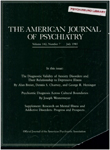Adaptive and pathogenic aspects of sex-role stereotypes: implications for parenting and psychotherapy
Abstract
There has been considerable controversy concerning adaptive versus pathogenic effects of sex-role stereotypes on individual development. The author evaluates both the positive and negative consequences of sex- role stereotypes without regard for any particular sociocultural definition of masculinity or feminity. She hypothesizes that the degree to which sex-role stereotypes are adaptive and facilitative (as opposed to restrictive and pathogenic) is inversely related to the degree to which an individual has consolidated a comfortable and stable gender is identity. Implications for parenting and treatment are elaborated.
Access content
To read the fulltext, please use one of the options below to sign in or purchase access.- Personal login
- Institutional Login
- Sign in via OpenAthens
- Register for access
-
Please login/register if you wish to pair your device and check access availability.
Not a subscriber?
PsychiatryOnline subscription options offer access to the DSM-5 library, books, journals, CME, and patient resources. This all-in-one virtual library provides psychiatrists and mental health professionals with key resources for diagnosis, treatment, research, and professional development.
Need more help? PsychiatryOnline Customer Service may be reached by emailing [email protected] or by calling 800-368-5777 (in the U.S.) or 703-907-7322 (outside the U.S.).



